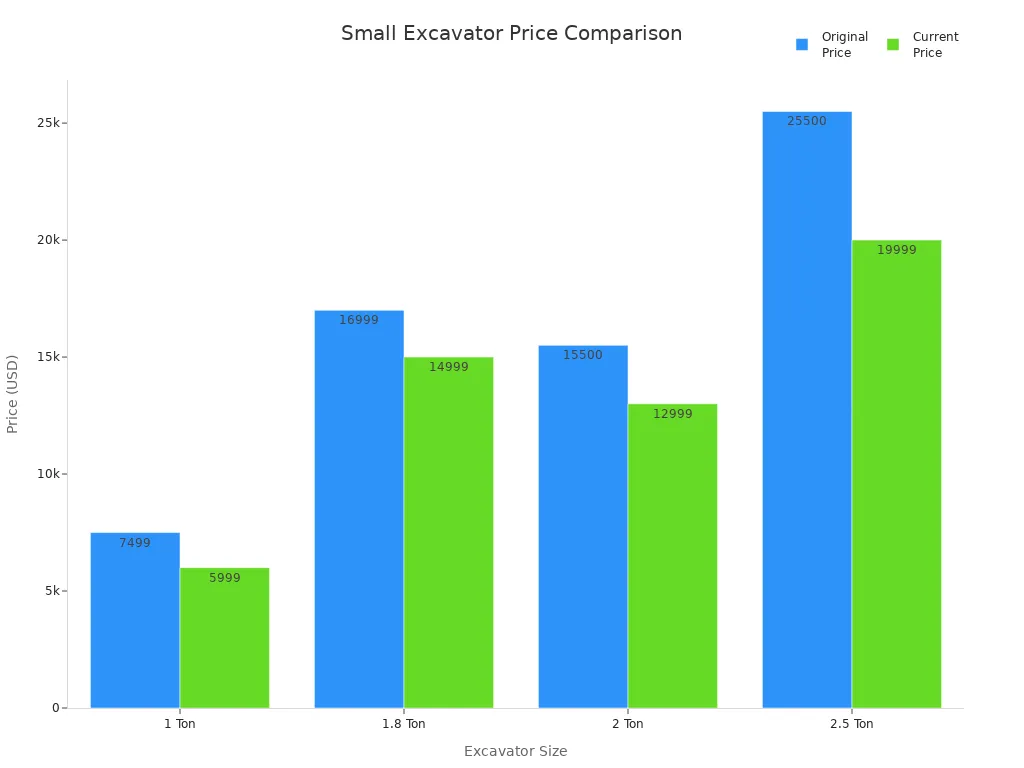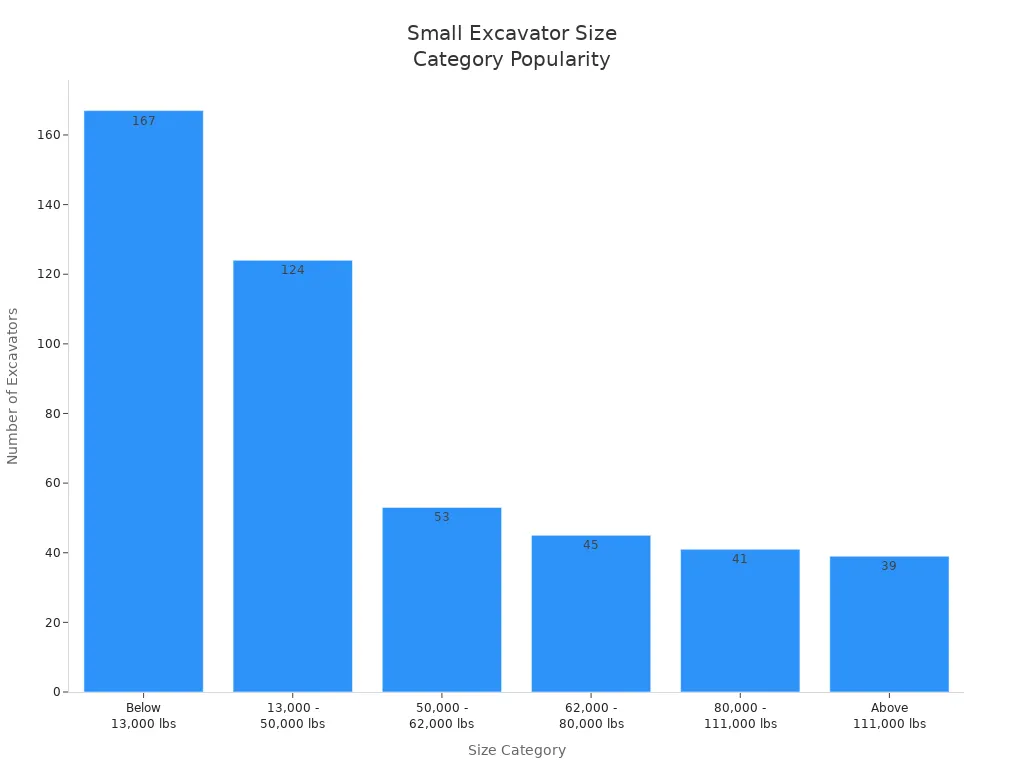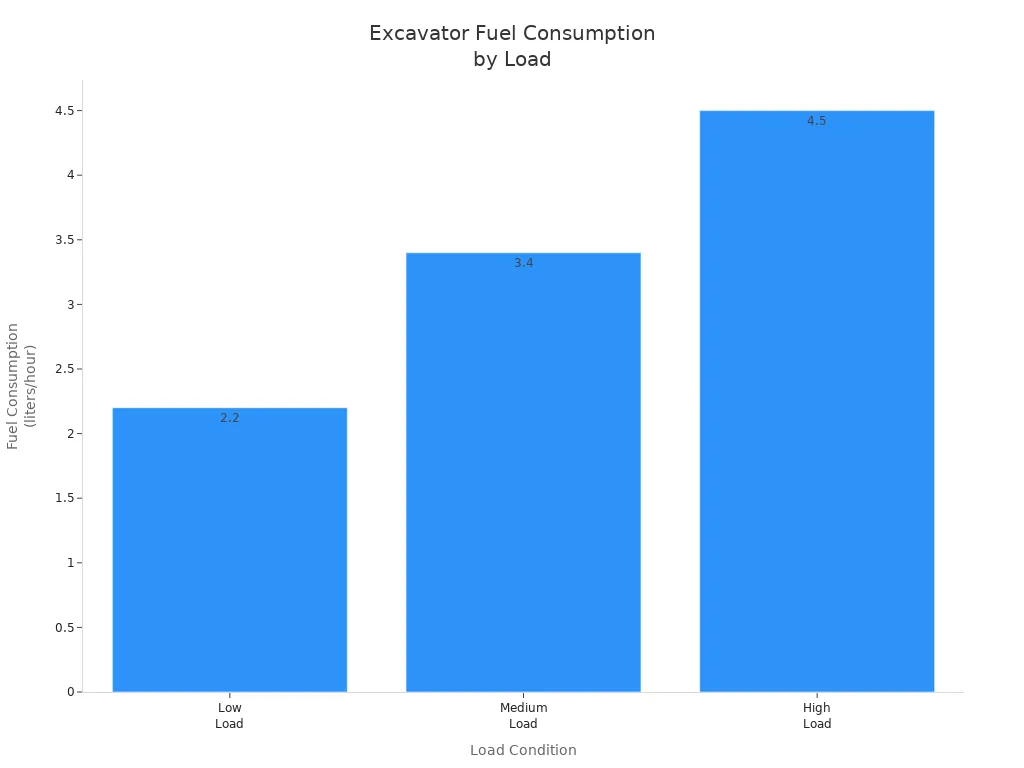Views: 0 Author: Site Editor Publish Time: 2025-09-09 Origin: Site








If you’re looking to get a small excavator, you probably want to know how much it will cost. Prices can change a lot depending on whether you want something new, used, or just need a rental. Take a look at this table to see what you might expect to pay:
Category | Price Range |
|---|---|
New Small Excavators (6-10 tons) | $120,000 – $180,000 |
Used (1-3 years old) | $80,000 – $120,000 |
Used (4-7 years old) | $50,000 – $90,000 |
Used (8+ years old) | $25,000 – $60,000 |
New Mini Excavators (1-2 tons) | $30,000 – $60,000 |
Used Mini (1-3 years old) | $20,000 – $75,000 |
Rental (average) | $4,300 |
Rental (range) | $600 – $8,000 |
Knowing these numbers helps you plan your budget and avoid surprises. The right small excavator can save you time and money if you pick one that fits your needs.
Learn about how much small excavators cost. New ones can be $30,000 to $180,000. Used ones have different prices. The price depends on how old they are and their condition.
Think about the brand when picking an excavator. Well-known brands might cost more money. They usually last longer and sell for more later.
Pick the right size excavator for your job. Smaller ones cost less and work for easy jobs. Bigger machines are better for hard work.
Remember extra costs like fixing, insurance, and fuel. Keeping it working can cost $1,000 to $5,000 each year. This changes how much you spend in total.
Choose to buy or rent based on how often you use it. Renting is good if you do not use it much. Buying saves money if you use it a lot.
When you look at the price of a small excavator, you’ll notice that several things can change how much you pay. Let’s break down the main cost factors so you can make a smart choice.
The brand you choose matters a lot. They often cost more because people trust them for quality and reliability. These brands have a good reputation, so you might pay extra for peace of mind and better customer service. Lesser-known brands can save you money, but they may not last as long or offer the same support. Here’s a quick look at how prices can differ:
Model Type | Starting Price | Premium Price |
|---|---|---|
Entry-Level | $5,000 | N/A |
Premium | N/A | $20,000 |
Size is one of the biggest factors in price. Bigger machines with more power cost more. If you only need a small excavator for light jobs, you can save money by picking a smaller model. Take a look at how size affects price:
Excavator Size | Original Price | Current Price |
|---|---|---|
1 Ton | $7,499 | $5,999 |
1.8 Ton | $16,999 | $14,999 |
2 Ton | $15,500 | $12,999 |
2.5 Ton | $25,500 | $19,999 |

Extra features can raise the price fast. If you want electric power, better hydraulics, or remote controls, expect to pay more. Attachments like augers or mulchers also add to the cost. Some attachments can cost as little as $650, while others go over $20,000. Think about what features you really need before you buy.
Tip: Start with the basics. You can always add more features or attachments later if you need them.
Where you buy your small wheel excavator can change the price, too. High demand in your area can push prices up. If you live in a place with lots of building projects, you might pay more. Import taxes and shipping fees also add to the cost if you buy from another country. Local rules and taxes can make a big difference, so always check before you buy.
Here’s a quick list of other things that can affect price:
Market demand
Financing options
Regulatory rules
Knowing these cost factors helps you pick the right small excavator for your needs and budget.
When you shop for a small excavator, you’ll notice that prices can swing a lot. Let’s look at what really drives those numbers.
The brand you pick can make a big difference. People trust these names because they last longer and hold their value better when you want to sell. If you go with a lesser-known brand, you might save money up front, but it could lose value faster. Here’s what you should know:
Top brands keep their value because buyers trust their performance.
Unknown brands often drop in price quickly and can be harder to sell later.
Used machines from trusted brands often come with a track record, which helps you feel confident about your purchase.
Size matters a lot for both price and running costs. Bigger machines use more fuel and cost more to buy. If you only need a small excavator for light work, a micro or mini digger could save you money on both purchase and fuel.
Excavator Size | Fuel Use (L/hr) | Operating Cost (£/hr) |
|---|---|---|
Micro Digger 0.8-1T | 1-2 | 1.46 - 2.92 |
Mini Digger | 3-4 | 4.38 - 5.84 |
3 Tonne Digger | 4-5 | 5.84 - 7.30 |
You’ll also see lots of choices by weight. Most small excavators fall below 13,000 lbs, which is the most popular size for small jobs.

Extra features can push the price up. Some buyers want advanced hydraulics, comfy seats, or telematics that track how the machine works. Others want to add attachments like buckets or augers. Here are some features that can change the price:
Advanced hydraulic systems boost performance and cost more.
Operator comfort, like better seats or climate control, can raise the price.
Telematics help you track the machine and can add value.
Custom attachments let you do more but increase the total cost.
Note: Sometimes, paying more for advanced features can save you money over time. Newer models with better tech may lower your ownership costs by up to 5%.
Where you buy your small excavator also affects the price. If you buy local, you skip big shipping fees and import taxes. Buying from far away or overseas might look cheaper at first, but shipping and customs can add up fast. Local demand matters, too. In busy areas with lots of building, prices can go up because more people want the same machines.
Cost Factor | Description |
|---|---|
Hidden Costs | Transportation, taxes, permits, and licensing fees can sneak up on you. |
Fuel, maintenance, and insurance add up over time. | |
Model Size and Attachments | Bigger machines and more attachments mean higher prices. |
New vs. Used | New machines cost more, but used ones might need more repairs. |
Geographical Location | Prices change by region because of shipping and local demand. |
Owning a small excavator means you need to think about more than just the price tag. Let’s break down the main costs you’ll face each year.
You want your machine to last, so regular maintenance is key. Simple things like oil changes and filter swaps usually cost between $200 and $500 a year. If you use your excavator a lot, you might spend more on repairs, especially for tracks and the undercarriage. These can run from $3,000 to $8,000 if they wear out. Hydraulic fluid and hoses add another $500 to $2,000 each year. Most owners spend $1,000 to $5,000 a year on servicing, depending on how hard they work their machine.
Maintenance Type | Cost Range |
|---|---|
Normal Maintenance | ~$300 per year |
Oil Changes and Filters | $200 to $500 annually |
Tracks and Undercarriage Repairs | $3,000 to $8,000 |
Hydraulic Fluid and Hoses | $500 to $2,000 |
Regular Servicing | $1,000 to $5,000 |
Tip: Keeping up with maintenance helps you avoid big repair bills later.
Insurance protects you if something goes wrong. Most small excavator owners pay between $83 and $127 each month for a general liability policy. Your price depends on where you live, how big your business is, and your experience. If you have a good track record, you might pay less.
Monthly insurance costs: $83–$127 for standard coverage
Prices change based on your location and business size
More experience and fewer claims can lower your rate
Fuel is a daily cost you can’t skip. How much you spend depends on how hard you work your machine. For a 23 hp mini excavator, you’ll use about 2.2 liters per hour at low load, 3.4 liters at medium load, and 4.5 liters at high load. If you push your machine harder, you’ll burn more fuel.
Load Condition | Fuel Consumption (liters/hour) |
|---|---|
Low Load | 2.2 |
Medium Load | 3.4 |
High Load | 4.5 |

Note: Lighter jobs save you money on fuel.
Every year, your machine loses some value. In the first year, a small excavator drops by 20–25%. After that, it loses about 5–10% each year. After five years, you can expect your machine to keep about 50–60% of its original value.
Year | Depreciation Rate | Value Retained |
|---|---|---|
1 | 20–25% | 75–80% |
2–5 | 5–10% per year | 50–60% |
If you take care of your machine, it will hold its value better when you want to sell.
Deciding whether to buy or rent a small excavator can feel tricky. You want to make the smartest choice for your wallet and your work. Let’s break it down so you can see what fits your needs best.
Buying makes sense if you plan to use your excavator a lot. If you have projects all year or need the machine more than a few times, owning can save you money in the long run. You get full control and can use it whenever you want—no waiting for a rental to become available. You also get tax benefits, like deductions under Section 179, which can help at tax time. Plus, when you own the machine, you can add attachments and even sell it later to get some of your money back.
Cost Aspect | Renting Mini Excavator | Buying Mini Excavator (with Attachments) |
|---|---|---|
Typical Use Frequency | 2–3 times/year | Unlimited |
10-Year Total Rental Cost | ~$25,000 | N/A |
Purchase Price | N/A | ~$50,000 |
Resale Value | N/A | 50–100% of investment possible |
Tip: If you use your excavator more than 2–3 times a year, buying often costs less over time.
Renting works best for short-term jobs or if you only need an excavator a few times a year. You don’t have to worry about repairs or storage. The rental company takes care of maintenance, which saves you time and money. Renting also helps you keep your cash free for other things, like growing your business or handling emergencies.
Renting spreads out your spending, so you don’t need a big deposit.
You avoid tying up your credit, which can help if you want to invest in other equipment.
You get access to the latest models without worrying about your machine getting old.
Here’s a quick look at the main advantages and disadvantages:
Renting | Buying |
|---|---|
Lower upfront cost | High initial investment |
Maintenance included | Owner pays for maintenance |
Flexible for short-term jobs | Best for frequent use |
No ownership or resale value | Build asset value over time |
May cost more long-term | Can save money if used often |
Note: Renting gives you freedom and less stress about repairs, but buying pays off if you use your excavator a lot and want to build value over time.
You want the best price for your small excavator. Start by checking seller ratings and looking at detailed specs. Trustworthy sellers usually have good reviews and clear information about their machines. Compare several listings before you decide. This helps you spot well-maintained options and see what’s normal for the market. Set your budget after you research similar excavators. If you talk to sellers, ask direct questions about price and any hidden costs. Stay ready to negotiate on price or features. If something feels off, don’t be afraid to walk away.
Check seller ratings and specs for trustworthy deals.
Compare listings to find the best value.
Set your budget based on research.
Ask direct questions about price and hidden fees.
Be ready to negotiate or walk away.
Tip: The more you know about the market, the easier it is to spot a great deal.
Negotiation can save you a lot of money. Always prepare before you talk to a dealer. Research prices for similar excavators so you know what’s fair. Decide your maximum price and stick to it. If you’re ready to buy, let the seller know. This can speed up the process. Mention if you might buy more equipment in the future. If the price won’t budge, ask for attachments or free maintenance. You can also request free delivery or discounts on shipping. Build a good relationship with the seller. Stay calm and polite. If the deal doesn’t feel right, walk away.
Prepare to negotiate, even if no discounts are shown.
Research prices to set your benchmark.
Set your max price and stick to it.
Show you’re ready to buy now.
Mention future business for leverage.
Ask for extras like attachments or free service.
Request free delivery or shipping discounts.
Build rapport with the seller.
Stay calm and polite.
Walk away if the terms don’t work for you.
You need to know the real cost before you buy. Use this simple formula to figure out what you’ll spend over time:
Total Cost of Ownership = Purchase Price + Operational Costs + Maintenance Costs - Resale Value
This formula helps you see the big picture. Add up what you pay to buy, run, and maintain your excavator. Subtract what you expect to get back when you sell it. Now you can make a smart decision and avoid surprises.
You now know what to expect when shopping for a small excavator. Prices can change based on brand, size, features, and where you buy. Remember to look at both the upfront price and the costs you will face over time. Use the tips and the total cost formula to help you make a smart choice. Careful planning helps you save money and avoid surprises.
Most small excavators last about 8,000 to 10,000 hours if you take care of them. That means you can use one for many years before you need a new machine.
Yes, you can! Small excavators work great for backyard projects like digging trenches, removing stumps, or making a garden pond. Just make sure you have enough space to move the machine.
You usually don’t need a special license for private use. If you use it for work or on public land, check your local rules. Some places may ask for training or a safety course.
You can use buckets, augers, thumbs, breakers, and even mulchers. Each attachment helps you do different jobs. Ask your dealer which ones fit your machine.
You’ll need a trailer and a truck with enough towing power. Always secure the excavator with chains or straps. If you’re not sure, ask a pro to help with loading and hauling.